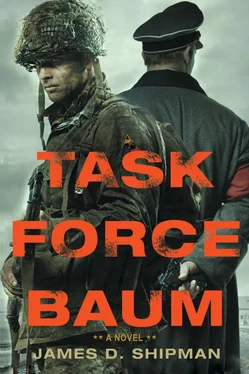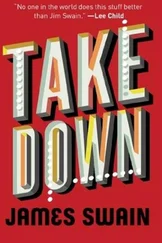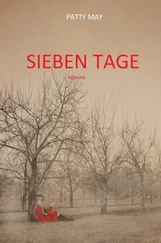Would they get there in time? The Germans were evacuating the camp. They’d waited for hours last night for the orders to come. Miraculously, there were delays. But they could be moved out any moment. Now, with the Americans on their doorstep, the excitement and dread rose to the highest pitch. If they could just hold on for a few hours, the army might rescue them in time.
Curtis moved away from his bed, sprinting past the others, who stood like statues, listening to the battle waging somewhere in the distance. He had to find out what the plan was. He left the front door and winced at the bright sunlight filtering through the crisp morning air. He’d left his jacket by his bunk. No matter, he couldn’t really feel the cold in his joy. He marched as rapidly as his weakened legs would allow, joining others who herded in a collective mass toward the headquarters barracks. The distant rumbling was distinct in the camp yard.
Curtis stormed into the command building and found most of the messengers already assembled. There was an electric charge to the atmosphere, and the men laughed and clapped their hands like joyous children on Christmas morning. Colonel Goode and Lieutenant Colonel Waters walked among the men. Waters’s face was lit up with an enormous grin, and he shook Curtis’s hand when he saw him.
“It’s happening,” he said.
“Do you think so, sir?”
“Definitely. Nothing else that thunder could be. Patton’s coming for us.”
“Any idea how long?”
Waters shrugged. “Doesn’t matter. He’ll be here soon enough.”
“What if we aren’t around to greet him?”
Waters’s face darkened a shade. “What will be will be. We have to be prepared… either way.”
As he said that, Goode clapped his hands a few times, drawing the group’s attention to their commander. He was beaming, his face giving off a light of its own.
“Okay, boys. This is it. The big day we’ve all waited for. It’s also a day of danger, from a batch of directions. We can’t do a damned thing about that. But we can be prepared. Now here’s what I want you all to do. First, go back to the boys and give them the plan. Second, it’s the same drill we discussed yesterday. I want each barracks to send a runner to the canteen. We’re going to divide up our Red Cross packs and all the grub. An equal amount for each group.”
“Why divide the food if we’re going to be rescued today? That sounds like we’re going to be marched away,” observed one of the officers.
“We have to prepare for a last-minute evacuation. But even if that doesn’t happen, we also must be ready for liberation. The front-line troops will be moving fast. They won’t have a batch of backup rations and supplies. It could be days until we’re properly supplied. We need to hope for the best and prepare for the worst.”
“What about the battle itself?” someone shouted.
“If it comes to a scrap for the camp, we need to hunker down in our barracks and stay the hell out of the way. We can’t fight these bastards without weapons. We wait for the shooting to stop. Trust me, our boys will recognize a POW camp when they see it. They’ll be careful.”
“What about the wounded?” asked Curtis.
Goode looked at Curtis. “Yes?”
“If we’re shipped out, we’re taking them with us, aren’t we?”
Goode considered the question. “I don’t know that. They didn’t let us in Poland.”
“And they killed them, didn’t they?”
Goode’s face flushed. “We don’t know that, Curtis. We just know they wouldn’t let us bring them along. Hell, the wounded would have died for sure if they’d come along with what we went through. Snow and ice, miles of hiking without shoes. They wouldn’t have lasted an hour out there.”
“Better for all of us to die than to leave them,” said the captain.
“Nonsense,” responded Goode sternly. “We don’t have control over everything. If they do take us and they do it by train, we might be able to arrange something. I’ll have a talk with the Kommandant and see if there’s anything I can do. But I’m sorry, captain; if it’s by foot, we don’t have a choice.”
Curtis nodded in response. Goode was going to talk to General von Goeckel, the camp commander. If there was any chance to save the wounded, the colonel would do his best.
“Now, if there aren’t any more questions, boys, we’ve got a batch of work to do. Get going, and let’s get things organized.”
There was a smattering of cheers and clapping, and the officers shuffled out of the command headquarters, hurrying back to their barracks to organize everything according to orders. Curtis moved as quickly as he could and was soon back in his own building, explaining everything to the excited men, who could barely contain themselves at the prospect of liberation at last. A lieutenant volunteered to pick up the food and left to retrieve it, a makeshift bag slung over his shoulder. The rest of the men set to work pulling down the plywood from the upper bunks and stacking sheet after sheet into a barricade near the center of the room. They worked with excitement but as quietly as they could. If a guard came in and saw what they were doing, there was no telling how he might react. They crafted a square shelter with boards stacked six thick in each direction. Curtis hoped with luck it would stop a stray bullet. He knew what would happen if they were hit with an artillery shell.
As they worked, Curtis realized the sound of explosions in the distance had faded and then stopped completely. What did this mean? Was it a pause before another attack? Had the Americans passed any German resistance? Or, he thought with a sinking heart, had the Nazis stopped them cold out there somewhere? Now that he had sipped the possibility of liberation, he didn’t think he could stand another day of waiting.
The lieutenant returned with their food. They had a sack of sugar, three complete Red Cross packs, and a dozen biscuits. The men looked at the food ravenously. They’d had hardly anything to eat lately as the rations had dwindled to practically nothing.
“Can we eat the biscuits now?” one of the men asked. There were grumbles of ascent from the assembled crowd, who had dropped what they were doing and were crowding tightly around the food packs.
“No, we can’t,” said Curtis. “We need to keep what we have for now.”
“Who put you in charge?” asked the man.
“I’m the runner. I took the orders.”
“That doesn’t make you in charge of us. You’re not even the top-ranking man in this barracks.” The man took a step forward and grabbed a biscuit. “I say these are ours. There’s plenty left for us to have later.”
Curtis tried to stop the men, but it was too late. The ravenous POWs stormed the center, grabbing the biscuits and tearing at the bread, shoving the bites into their mouths. One officer struck another in the face, knocking him back so he could get at the bread. Other hands seized the Red Cross packs, tearing them open with greedy hands, cackling maniacally. The men scrambled in, tearing and fighting as they battled for any food they could get ahold of. Curtis screamed at them, but they were starving, and the lure of the ready food was too much. They stuffed their faces, grunting and groaning in pleasure like a pack of animals. Curtis shuffled away, powerless and dejected. He had failed again.
* * *
The captain sat by himself, his eyes closed. He could hear the joyous grumbling of the men around him, but he tried his best to ignore them. He felt a tug on his shoulder. He looked up, and the lieutenant who had started the stampede was standing over him. He was holding out half of a biscuit and three cigarettes he’d retrieved from a Red Cross pack. “Here, captain, take these.”
Читать дальше












